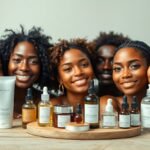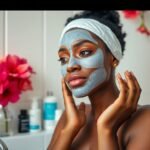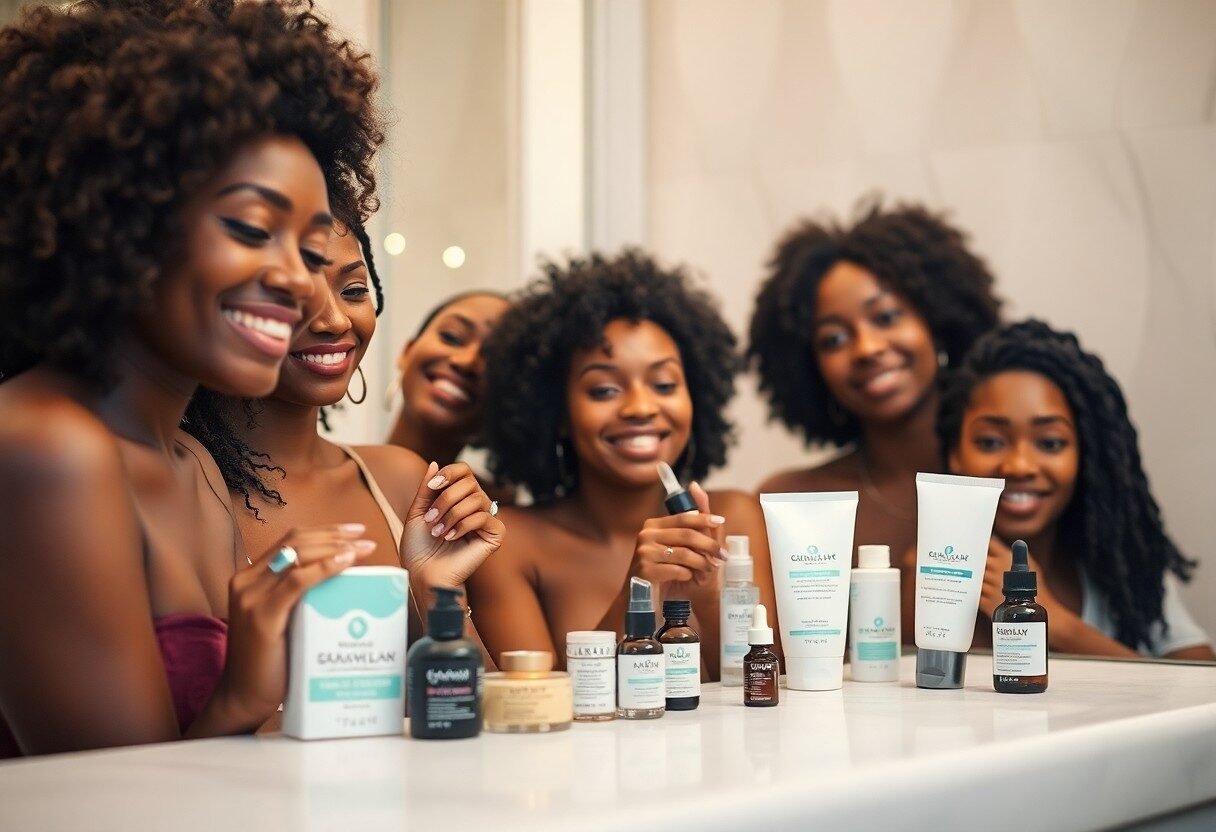
Just like your unique beauty, your skincare routine should reflect your distinct needs. I know that finding the right products can feel overwhelming, but I’m here to guide you through important skincare items that cater specifically to melanin-rich skin. From moisturizers designed to combat dryness to treatments that address hyperpigmentation, this post will highlight what you truly need to enhance your natural glow. Let’s explore the world of skincare that celebrates and nurtures your beautiful complexion.
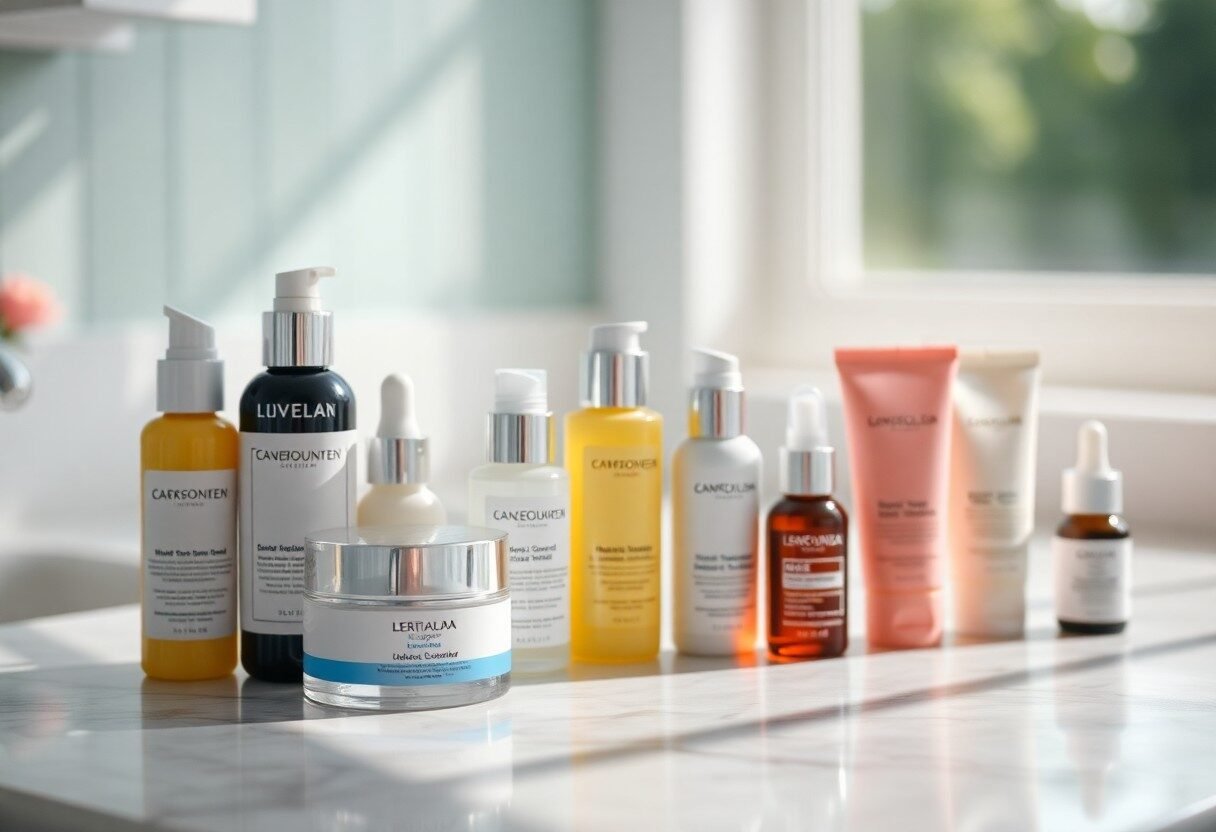
Key Takeaways:
- Invest in a high-quality moisturizer that caters to the specific needs of your skin type, particularly for hydration and nourishment.
- Sunscreen is important year-round, with a broad-spectrum SPF to protect against UV rays and prevent hyperpigmentation.
- Choose serums containing vitamin C or niacinamide to brighten complexion and even out skin tone.
- Exfoliate regularly with products that suit your skin type to promote cell turnover and maintain a fresh appearance.
- Use a gentle cleanser that effectively removes makeup and impurities without stripping natural oils.
- Look for hydrating ingredients like hyaluronic acid and shea butter in your skincare to enhance moisture retention.
- Consider a targeted treatment for specific concerns, such as acne or dark spots, to achieve clearer and more balanced skin.
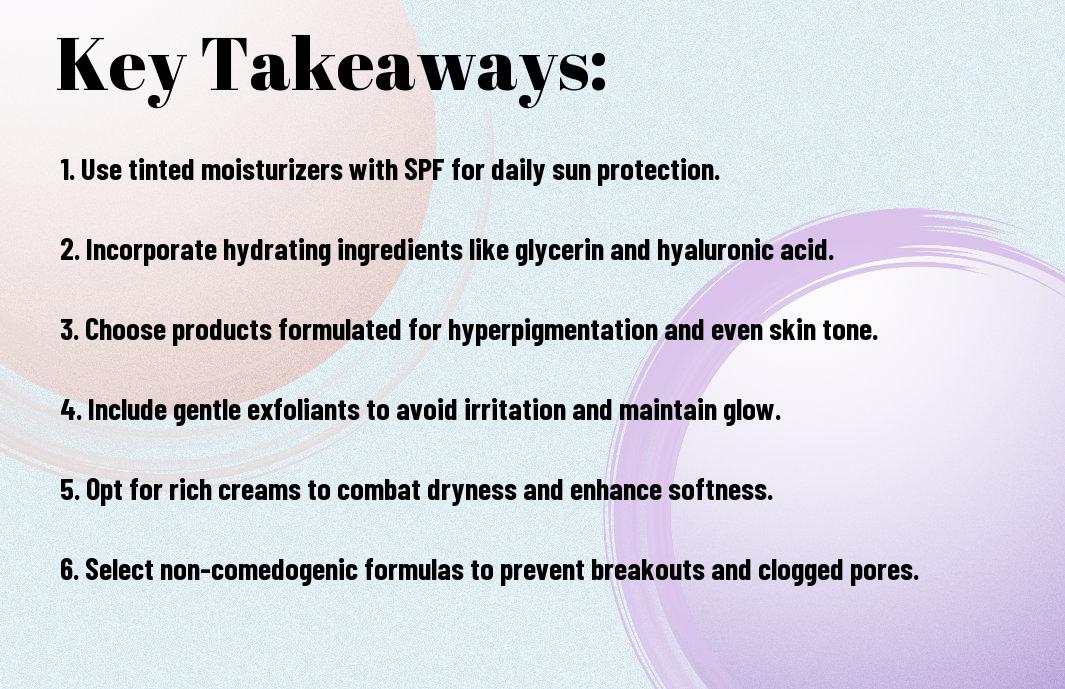
The Unique Skincare Needs of Melanin-Rich Skin
Understanding the unique properties of melanin-rich skin is vital for developing an effective skincare routine. The increased melanin provides some natural protection against UV damage, but it also presents its own set of challenges. This skin type tends to be more prone to issues such as hyperpigmentation, uneven skin tone, and dehydration, making it necessary to use targeted products that cater to these specific concerns. Nurturing your skin should focus on enhancing its natural beauty while addressing its distinct needs.
Understanding Hyperpigmentation and Its Challenges
Hyperpigmentation results from excess melanin production, often triggered by inflammation or sun exposure. Unlike lighter skin tones, melanin-rich skin may darken more significantly and recover slower from these triggers. For instance, post-acne marks can linger longer, making it crucial to integrate brightening agents such as Vitamin C or Niacinamide in your routine. Addressing hyperpigmentation can take patience and persistence, but tailored treatments can help reveal a more balanced complexion.
The Importance of Moisture Retention for Diverse Skin Types
Moisture retention is a significant factor in ensuring your skin stays healthy and vibrant. Melanin-rich skin can sometimes appear drier, highlighting the need for effective moisturization. Products like hyaluronic acid and glycerin can attract and lock in moisture, preventing the skin from becoming ashy or uneven. Additionally, a hearty moisturizer can create a protective barrier against environmental stressors and enhance the skin’s natural glow. A well-hydrated complexion serves as the perfect canvas for any makeup or skincare routine.
| Benefits of Hydration: | Hydrating Ingredients: |
| Reduces dryness | Hyaluronic acid |
| Boosts elasticity | Glycerin |
| Enhances glow | Aloe vera |
| Prevents irritation | Shea butter |
- Hydration keeps the skin plump and youthful.
- Moisturizing prevents flakiness and rough patches.
- Barrier protection shields against environmental stressors.
- Long-lasting results improve overall skin health.
- Perceiving the connection between hydration and skin vitality is key for achieving a radiant look.
Maintaining moisture is not simply about applying a product; it’s about creating a routine that reinforces your skin’s natural defenses. Frequent application of a thick cream or overnight mask can significantly improve your skin’s texture and feel. Look for formulations that cater specifically to melanin-rich skin, with natural oils and nourishing vitamins that work in harmony. Taking a proactive approach ensures your skin stays resilient, hydrated, and beautiful.
Must-Have Ingredients for Radiant Complexion
To achieve a radiant complexion, I always consider incorporating specific ingredients that cater to the needs of melanin-rich skin. These ingredients not only help in enhancing glow and vitality but also address common concerns like hyperpigmentation and hydration. Familiarizing yourself with these powerhouse components can elevate your skincare routine significantly, ensuring that your skin looks its best at all times.
The Power of Vitamin C and Its Brightening Effects
Vitamin C acts as a strong antioxidant, protecting your skin from free radicals while enhancing its brightness. This potent ingredient reduces hyperpigmentation and evens out skin tone, making it an important component in your regimen. Regular use can lead to visible improvements, providing that sought-after luminosity.
The Role of Hyaluronic Acid in Hydration Intensity
Hyaluronic Acid is known for its ability to hold up to 1,000 times its weight in water, offering unparalleled hydration. For melanin-rich skin, this means maintaining moisture levels that prevent dryness and enhance overall plumpness. With consistent application, your skin will feel more hydrated and resilient, leading to a youthful appearance.
I find that incorporating a serum with Hyaluronic Acid into my routine transforms my skin’s texture. Dehydration is less of an issue, and I’ve noticed that my makeup applies more smoothly. This ingredient not only boosts moisture but also fortifies my skin barrier, making it less reactive to environmental stressors. Remember to layer it under a good moisturizer for an added hydration boost.
Exploring Natural Oils: Benefits of Jojoba and Argan
Natural oils like Jojoba and Argan are rich in nutrients that nourish your skin without clogging pores. Jojoba oil mimics the skin’s natural sebum, offering a lightweight solution for hydration, while Argan oil is overflowing with fatty acids that promote healing and add a beautiful glow. Both oils complement each other, making them perfect staples in a skincare routine.
In my experience, Jojoba oil has been fantastic for balancing oily areas while still providing moisture to dry patches. It works seamlessly under makeup, preventing that dreaded shine. On the other hand, Argan oil is my go-to for deep nourishment, especially during colder months. It leaves my skin feeling silky and rejuvenated while also tackling any dryness. Combining these two oils has truly made a difference in the overall health and radiance of my skin.
Sunscreen: The Unseen Protector for Darker Skin Tones
Many people often underestimate the need for sunscreen, especially those with deeper skin tones. However, UV rays can still damage darker skin, leading to issues like hyperpigmentation and premature aging. Daily application of a broad-spectrum SPF not only protects your skin from harmful rays but also helps maintain an even skin tone. Incorporating sunscreen into your routine transcends seasons; whether it’s sunny or cloudy, protecting your skin should always be a priority.
Debunking Myths About SPF and Black Skin
A common myth is that darker skin doesn’t need sunscreen because of its natural SPF protection. This misconception can lead to significant skin damage. In fact, while melanin offers some protection from UV rays, it’s not enough to shield skin from all spectrum effects, like causing cancers or premature aging. An SPF of at least 30 is beneficial regardless of skin color and should be part of your daily skincare regimen.
Choosing Mineral vs. Chemical Formulations
Understanding the difference between mineral and chemical sunscreens is key to choosing the right product for your skincare needs. Mineral sunscreens contain active ingredients like zinc oxide or titanium dioxide that sit on the skin’s surface, creating a barrier against UV rays. In contrast, chemical formulations absorb UV radiation and convert it into heat, releasing it from the skin. Many prefer mineral formulations for their broader protective capabilities and less irritation on sensitive skin.
When opting for between these two types, consider your skin type, lifestyle, and personal preferences. Mineral sunscreens tend to be better suited for sensitive skin, as they contain fewer irritating ingredients. They also provide immediate protection post-application, making them ideal for beach days. On the other hand, chemical sunscreens may offer a lighter feel and are often formulated to be more cosmetically elegant under makeup. Ultimately, the best choice is what works for your skin’s specific needs, ensuring consistent protection.
Cultivating a Tailored Routine: Day vs. Night
Your skin has different needs throughout the day and night cycle, which is why establishing a tailored routine is important. During the day, your skin requires protection from environmental stressors and hydration to maintain a healthy glow. In contrast, nighttime is when your skin rejuvenates and repairs itself, so your evening regimen should focus on soothing and nourishing your skin deeply. Adapting your products and steps for each part of the day can optimize your skincare results significantly.
Essential Morning Steps for Protection and Prep
Mornings should begin with gentle cleansing to remove any overnight oil buildup. Follow this with a hydrating toner that can balance your skin’s pH and prep it for further products. Incorporating a high-quality sunscreen is vital, as it shields your skin from harmful UV rays and environmental pollutants. A lightweight moisturizer can provide the necessary hydration without feeling heavy, leaving your skin fresh and ready to face the day.
Evening Rituals for Repair and Rejuvenation
Evenings serve as prime time for your skin’s recovery process. Start with a thorough double cleanse to eliminate makeup and impurities, ensuring that your skin is clear before applying treatment products. Exfoliation a few times a week can help slough off dead skin cells, promoting cell renewal. After this, apply serums rich in ingredients like hyaluronic acid and vitamin C to hydrate and repair. Finish with a rich moisturizer that will deeply nourish your skin overnight, making it plump and vibrant for the morning.
In the evening, focusing on repair and rejuvenation allows your skin to address damage accumulated throughout the day. Look for serums with active ingredients like retinol or peptides, which actively promote cell turnover and collagen production. Incorporating a weekly clay mask can also help absorb excess oil and detoxify your skin. Essential nutrients such as shea butter or oils rich in fatty acids can seal in moisture and enhance your skin’s barrier function overnight. This comprehensive approach is not just about treating your skin, but actively promoting its health and resilience.
Navigating Sensitivity: Responding to Common Irritations
Navigating skin sensitivity requires a keen understanding of your skin’s reactions and what triggers them. Whether it’s environmental changes, certain ingredients, or lifestyle habits, identifying these irritants will help you better manage and soothe your skin. I’ve often found that a gentle touch and minimal products can significantly reduce breakouts and redness, leading to a calmer complexion. Armed with knowledge about your skin, you can create a more harmonious skincare routine that respects and nurtures your unique skin type.
Identifying Ingredients That May Cause Breakouts
Certain skincare ingredients can be common culprits for breakouts, especially for those of us with more sensitive skin. I recommend being cautious with heavy oils, fragrances, and alcohol-based products, as these can lead to clogged pores and irritation. Always check labels for ingredients like *sodium lauryl sulfate* and *parabens*, which are known to exacerbate sensitivity. By keeping your ingredient list simple and avoiding known irritants, you can promote healthier, breakout-free skin in your routine.
The Benefits of Patch Testing New Products
Patch testing new products is a smart strategy to prevent adverse reactions and ensure compatibility with your skin. By applying a small amount of the new product on a discreet area, typically the inside of your wrist or behind your ear, you can observe any potential negative reactions before committing to a full application. This step can save your skin from unnecessary irritation and helps in building a skincare wardrobe that truly works for you.
Patch testing allows you to limit exposure to potential irritants before they affect larger areas of your skin. As someone who’s learned the hard way, I’ve experienced the fallout of spontaneous product use—breakouts, rash, and discomfort. Conducting a simple patch test can reveal how your skin reacts within 24 to 48 hours, giving you peace of mind. This proactive approach not only builds confidence in your selection but also ensures you’re prioritizing your skin’s health over trial and error. It’s both a protective measure and a smart habit that fosters a successful skincare journey.
Summing up
As a reminder, choosing the right skincare products tailored to your unique skin needs is necessary for every Black woman. I’ve shared my insights on the importance of hydration, sun protection, and targeted treatments. By incorporating these products into your routine, you can enhance your skin’s natural beauty and address specific concerns. Trust your skin’s journey and select products that resonate with your individual needs for a radiant and healthy complexion. Your skin deserves the best care possible.
FAQ
Q: What are the imperative skincare products every Black woman should have?
A: Every Black woman should consider incorporating a gentle cleanser, a hydrating toner, a rich moisturizer, a nourishing sunscreen, a targeted serum, an exfoliant, and a lip balm. These products address specific skin concerns and help maintain healthy, glowing skin.
Q: Why is sunscreen important for Black women?
A: Sunscreen is important for everyone, including Black women, as it protects against UV rays that can cause skin damage, premature aging, and increase the risk of skin cancer. Although melanin offers some natural protection, it is still imperative to use broad-spectrum sunscreen daily, regardless of skin tone.
Q: How can I choose the right moisturizer for my skin type?
A: To choose the right moisturizer, first identify your skin type—oily, dry, combination, or sensitive. Look for a moisturizer that contains ingredients suitable for your skin type; for instance, opt for oil-free products for oily skin and thicker creams with shea butter or hyaluronic acid for dry skin.
Q: What role does hydration play in skincare for Black women?
A: Hydration is imperative in skincare as it helps maintain the skin’s barrier function and prevents dryness and flakiness. Black women are particularly prone to dehydrated skin, so using hydrating products like serums and creams with ingredients such as glycerin and aloe vera can help achieve a plump and healthy appearance.
Q: Are there specific ingredients that benefit Black women’s skin?
A: Yes, ingredients like shea butter, jojoba oil, vitamin E, and niacinamide are particularly beneficial for Black women’s skin. These components help with moisture retention, skin elasticity, and addressing hyperpigmentation, common concerns for many in this demographic.
Q: How often should exfoliation be incorporated into my skincare routine?
A: Exfoliation can generally be done 1-2 times a week, depending on your skin’s tolerance. Regular exfoliation helps to remove dead skin cells, improve skin texture, and reduce the likelihood of clogged pores and breakouts. However, avoid over-exfoliating, as it can lead to irritation.
Q: What should I look for in a lip balm for my skin type?
A: Look for a lip balm that offers moisture and protection. Ingredients such as beeswax, shea butter, and imperative oils can help keep lips hydrated and nourished. Avoid balms with heavy fragrances that can irritate sensitive lips, and choose products with SPF for daytime use to prevent sun damage.


